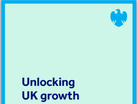Why Barclays Uses Client Data to Track UK Business Health

Barclays has developed a quarterly business performance tracker that combines lending, cashflow and international payments data from approximately one million UK business customers with external market research to gauge economic confidence.
The Business Prosperity Index, developed in partnership with the Centre for Economics and Business Research (Cebr), uses anonymised transaction data alongside quarterly surveys of 1,000 business leaders to measure current performance and growth opportunities across the UK business sector.
The index aims to provide a comprehensive view of business sentiment by combining actual financial data with forward-looking survey responses.
Investment appetite strengthens
The inaugural index reveals UK businesses plan to increase investment by 1.4% in Q3 2024 compared to the same period last year, up from 0.7% in Q2.
The data shows businesses are prioritising staff training and research and development, with 44% of firms focusing on workforce development and 35% on product improvement.
Transaction data from Barclays business accounts indicates improved financial resilience in Q3 2024 versus Q3 2023.
While cash inflows declined by 3% year-on-year, a larger reduction in outflows led to a 17% increase in net cash flow – the difference between money entering and leaving business accounts.
The value of drawn loans, which refers to the total amount borrowed against available credit facilities, rose 4.8% annually in Q3 2024, accelerating from 3.6% in Q2.
"Our new Index is designed to be a bellwether of business sentiment, performance and future growth opportunities"
Post-budget confidence emerges
A supplementary survey of 500 business leaders conducted after the UK government's recent budget reveals that 46% of firms had previously suspended investment plans but now intend to proceed.
The research indicates that 37% of businesses are more likely to seek additional funding to invest in growth, while 61% express confidence in the budget's economic impact.
In response to these findings, Barclays has launched a £22bn ($27.8bn) Business Prosperity Fund for new and existing business banking and corporate clients. The fund aims to support both refinancing of existing facilities and new lending.
Skills shortage impacts growth
The index highlights workforce challenges across the UK, with 62% of business leaders reporting difficulties accessing skilled labour.
Of these, 77% say the shortage negatively impacts their growth potential. Regional variations show the issue is most acute in Scotland, where 92% of businesses report skills shortages, followed by Yorkshire and the Humber at 90% and the West Midlands at 88%.
The data also reveals changing consumer behaviour patterns. Businesses report customers are extending purchase decision timelines (25%), seeking lower-cost alternatives (25%), and scrutinising value propositions (20%).
In response, 84% of firms have implemented retention strategies, including product modifications and supply chain restructuring.
Post-peak inflation pressures
The index identifies a period of post-peak inflation, where inflation rates have moderated but businesses face sustained high production costs.
To maintain customer relationships, 65% of companies have reduced prices, either across their entire range (31%) or through targeted promotions (41%).
Despite these pressures, 52% of businesses commit to expanding their product and service offerings following the budget announcement. The focus on training remains strong, with 42% of firms identifying staff development as an investment priority.
Hannah Bernard, Head of Barclays Business Banking, says: “Our new Index is designed to be a bellwether of business sentiment, performance and future growth opportunities. It's reassuring that businesses remain committed to investing to grow, despite the extra financial pressures faced by many.”
Matt Hammerstein, Chief Executive of Barclays UK Corporate Banking, adds: “The economic environment remains challenging for those on tight margins, but there are signs of cautious optimism emerging. Our data shows many businesses with investment plans on hold are now confident to kick-start growth by seeking the funding they need.”
Matt Hammerstein, Chief Executive of Barclays UK Corporate Banking, says: “The economic environment remains challenging for those on tight margins, but there are signs of cautious optimism emerging. Our data shows many businesses with investment plans on hold are now confident to kick-start growth by seeking the funding they need.”
Hannah Bernard, Head of Barclays Business Banking, adds: “Our new Index is designed to be a bellwether of business sentiment, performance and future growth opportunities. It's reassuring that businesses remain committed to investing to grow, despite the extra financial pressures faced by many.”
**************
Make sure you check out the latest edition of FinTech Magazine and also sign up to our global conference series – FinTech LIVE 2024.
**************
FinTech Magazine is a BizClik brand.


